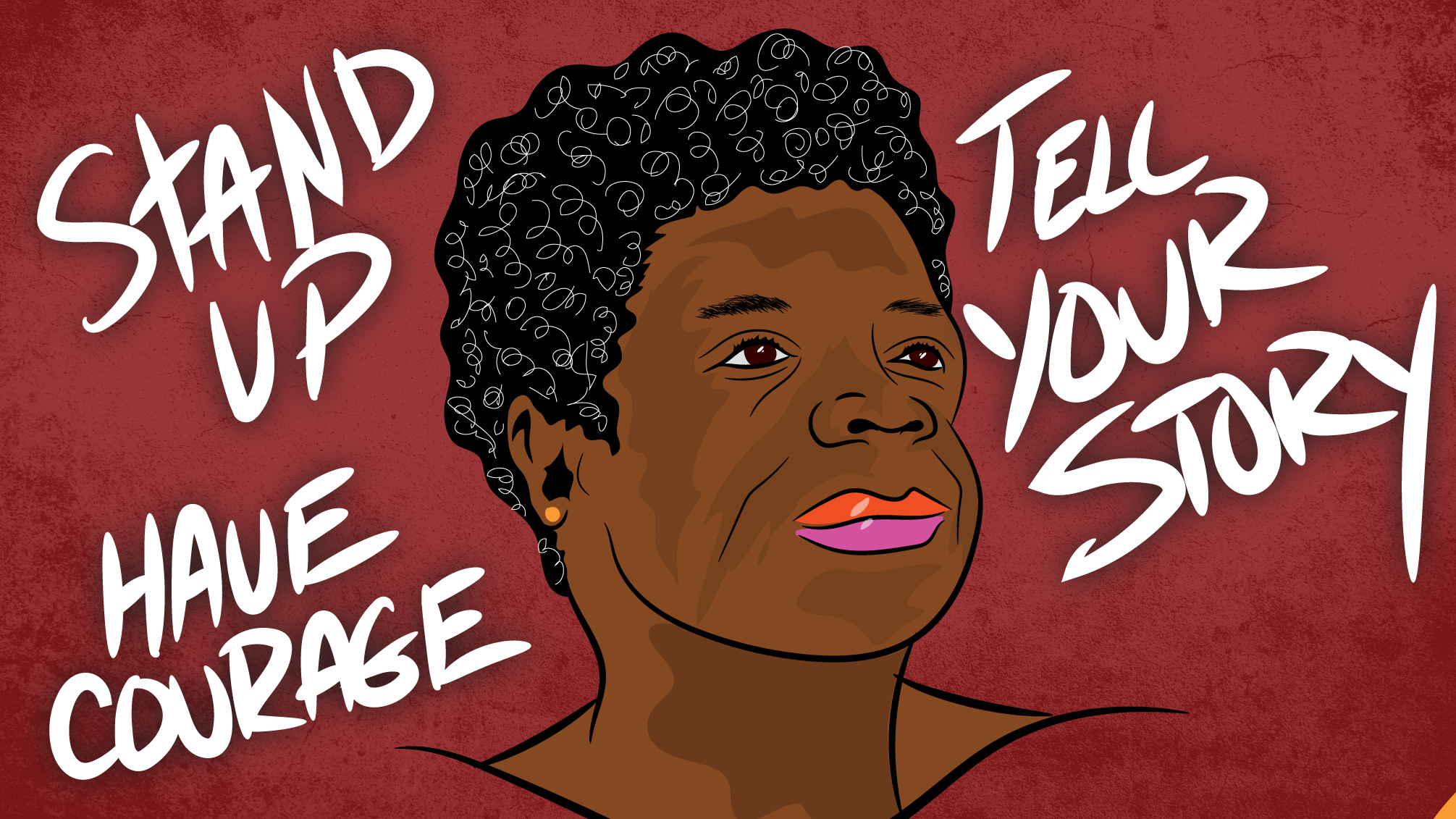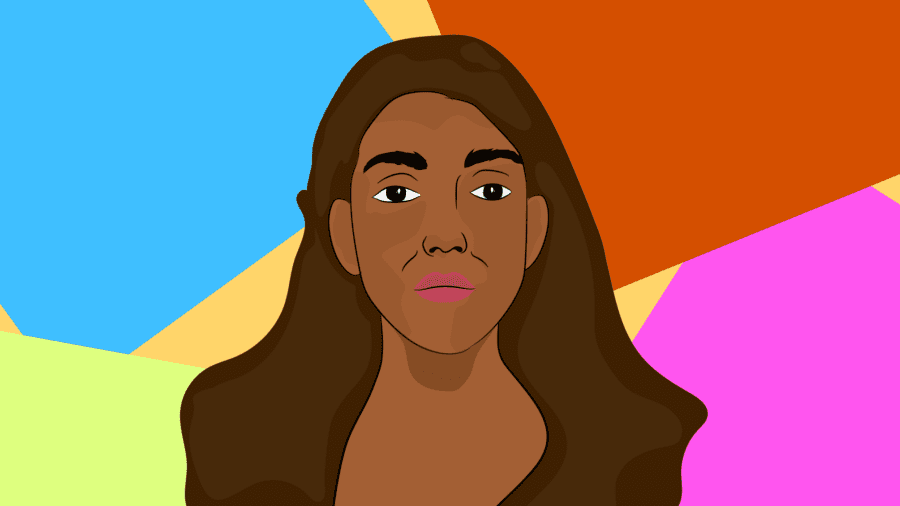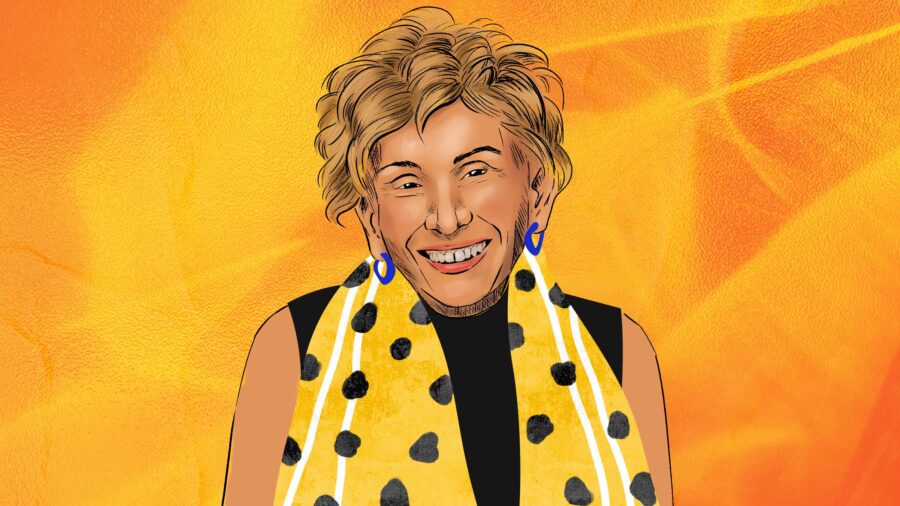
Honoring Maya Angelou: Black Poet, Civil Rights Activist, and Memoirist Who Changed the World
“My mission in life is not merely to survive, but to thrive; and to do so with some passion, some compassion, some humor, and some style.” – Maya Angelou
Do you have the courage to stand up and inspire others?
Often, it seems like individual people can’t change their surroundings. In the face of seemingly countless crises and never-ending bad news, it can be tough to feel inspired and believe in our power to bring about positive changes in the world around us. Even when you feel like the world is working against you and you’re faced with tremendous challenges, you have the power to make an impact.
Author and civil rights activist Maya Angelou grew up in a world that was against her. As a Black woman growing up in America in the 1930s and 1940s, she faced tremendous hardships surrounding systemic racism and racial prejudice. On top of that, Maya also suffered from unthinkable abuses as a child.
Although she was up against great adversity, she went on to create critical works that promoted Black culture, and she inspired other African-American artists to tell their stories. Additionally, she played an important role in the civil rights movement and worked with Martin Luther King Jr. and Malcolm X.
Her story is truly inspiring and demonstrates the power of the individual.
Maya Angelou’s Early Life
Due to the disturbing nature of some of the events surrounding Maya Angelou’s childhood, including child abuse and a horrendous sexual assault, some may find the graphic descriptions within this section triggering.
Maya Angelou was born in St. Louis, Missouri as the second child and only daughter of Bailey and Vivian Johnson. Maya’s father worked as a doorman, and her mother was a nurse. Although she eventually became known by her pseudonym, she was born with the name Marguerite Johnson.
From a young age, Maya Angelou experienced incredible hardships. When she was three, her parents split up, and she and her older brother, Bailey Jr., moved to Stamps, Arkansas, to live with her grandmother, Annie Henderson. Their grandmother was economically well off and owned a general store. These good times would be short-lived, however.
At age 7, Maya and her brother returned to Missouri after their father showed up unannounced in Arkansas and returned them to their mother’s care in St. Louis.
Tragically, Maya Angelou experienced unthinkably horrendous crimes while living with her mother. At age 8, she was repeatedly molested and eventually raped by her mother’s boyfriend, a man named Mr. Freeman. Angelou details this tragic experience in her famous autobiographical work, I Know Why the Caged Bird Sings.
After learning of the abuse, Maya’s mother took her to the hospital, and while there, Maya’s brother convinced her to reveal her attacker. She said it was her mother’s boyfriend, and authorities arrested Mr. Freeman shortly after.
Although a victim of Mr. Freeman’s repeated abuses and eventual attack, Maya felt great shame around the event. She lied in court by saying that the rape was the only sexual incident that had occurred.
The court issued a prison sentence of one year and one day, but Mr. Freeman was temporarily released after his hearing and killed before being brought to prison. Although the assailants were never discovered, Maya suspected that her uncle had ended his life.
Overwhelmed with tremendous guilt over the incident, Maya stopped speaking entirely to anyone but her brother. She viewed Mr. Freeman’s death as her own fault and continued being almost entirely mute for years.
How a Remarkable Woman Helped Maya Angelou Regain Speech and Acquire Interest in Literature
Shortly after the horrendous attack, Maya and her brother returned to Arkansas to live with their grandmother. There, she continued living almost entirely mute.
Maya began attending the Lafayette County Training School, where she met a critical influence in her life: Bertha Flowers. Maya Angelou admired Bertha Flowers because she was a well-educated and graceful Black woman, qualities that Maya admired and wanted.
Bertha Flowers decided to take Maya under her wing and eventually helped her regain the desire to speak. She shaped Maya’s early education by introducing her to famous literary icons like Charles Dickens, William Shakespeare, and Edgar Allen Poe. She also showed Maya influential Black authors like Langston Hughes, Anne Spencer, W.E.B. Du Bois, Jessie Fauset, Paul Lawrence Dunbar, and Frances Harper.
Maya began speaking again at the age of 12 ½, almost five years after Mr. Freeman’s attack, thanks to Bertha Flowers’ teachings. Together, they studied poetry, and Maya admired her teacher’s recitation skills. Bertha Flower used poetry to challenge Maya to speak again.
In an interview with NPR, Maya Angelou stated that Bertha Flowers asked whether or not she loved poetry. When Maya indicated that she did, Flowers responded by saying, “You do not love poetry. You will never love it until you speak it. Until it comes across your tongue, through your teeth, over your lips, you will never love poetry.”
Her teacher’s challenge was incredibly effective — Maya began speaking again through poetry recitation. Throughout her childhood, she continued developing her love for literature and poetry, and her interest in the literary arts led to her becoming a powerful voice in the fight against sexual violence.
Maya Angelou’s Early Adult Life as a Cabaret Performer and Singer
In her teenage years, Maya relocated to San Francisco, where she attended George Washington High School and won a scholarship to study dance and drama at the California Labor School.
At age 16 and only weeks after graduating high school, Maya Angelou had her only child, Guy Johnson — like his mother, Guy became an accomplished poet. Sadly, he passed away in February 2022. After giving birth, Maya worked many different jobs to support her son. She worked as a shake dancer, fry cook, dinner cook, and sex worker.
In the early 1950s, she married a Greek electrician and aspiring musician named Rosh Angelos, a brave decision as interracial marriages were met with harsh disapproval and sometimes violence.
During that period, Maya also studied as a dancer and developed a professional relationship with acclaimed dancer and choreographer Alvin Ailey. She and Ailey formed a dance team called “Al and Rita” and performed around San Francisco.
For a short time in 1951, Maya Angelou and her family relocated to New York City so that she could study African dance with choreographer and anthropologist Pearl Primus. She and her family moved back to San Francisco a year later.
Angelou’s marriage with Rosh Angelos ended in 1954. Around that time, Maya began dancing cabaret in various nightclubs around San Francisco. She also started singing calypso music — an Afro-Caribbean style of music that started in Trinidad and Tobago — and danced for the nightclub, The Purple Onion. There, she began going by her pseudonym, Maya Angelou.
She made a name for herself in her early dance and music career at The Purple Onion, and she joined a production of the opera Porgy and Bess, touring Europe in 1954 and 1955.
And in 1957, she released her first and only studio album titled Miss Calypso during the height of calypso music’s popularity in the United States.
Join In 200 Million+ On The Journey to Greatness
Maya Angelou’s Early Writing Career and Involvement in the Civil Rights Movement
Maya Angelou’s interest in literature and writing returned when she met John Oliver Killens, an acclaimed African-American novelist, in 1959.
Killens encouraged Angelou to focus on her writing career, and shortly after, she moved back to New York City and joined the Harlem Writers Guild. There, she met many influential writers, including James Baldwin, author of Go Tell It on the Mountain, Notes of a Native Son, and other important works that include racial and social commentary.
During this period, Maya Angelou met civil rights leader Martin Luther King Jr. She had the opportunity to hear him speak at a church in Harlem, leading her to become heavily involved in the movement.
Like numerous Black individuals, Angelou experienced hardships surrounding racism from a young age, including racial prejudice and discrimination in Arkansas and Missouri, which she describes in I Know Why the Caged Bird Sings.
In the 1950s, African Americans were subject to widespread racism. Many Southern and border states still enforced Jim Crow laws, which implemented oppressive segregation rules and restricted African Americans’ voting rights.
After hearing Martin Luther King Jr. speak, Maya Angelou produced the Cabaret for Freedom, along with Killens and actors Godfrey MacArther Cambridge and Hugh Hurd. The show’s proceeds went toward the South Christian Leadership Conference (SCLC), an essential civil rights organization that MLK started in Atlanta, Georgia.
The night was a huge success, and the show raised so much money that the director of the SCLC in New York, Bayard Rustin, recommended Maya to take over his leadership position. She became the director of the SCLC’s New York office, working with Rustin, MLK, and labor unionist A. Philip Randolph.
While serving as the director, Maya Angelou played an integral role in raising funds to combat Jim Crow laws and helped inform the American public about the travesties surrounding racism, segregation, and violence against Black Americans.
Maya Angelou’s Time in Africa and Continuing Work in the Civil Rights Movement
In the 1960s, Maya Angelou departed from her leadership position at the SCLC and moved to Africa with her son. They first lived in Cairo, Egypt, where she served as an associate editor for The Arab Observer. There, she lived with South African freedom fighter and anti-apartheid activist Vusumzi Make.
Shortly after, Maya relocated to Accra, Ghana, so her son could attend the University of Ghana. While in Ghana, she worked as an administrator at the university, served as the editor for The African Review, and was also a writer for the Ghanaian Times and Radio Ghana.
While in Accra, Maya Angelou developed a friendship with Malcolm X, who was also visiting Africa at the time. She returned to the United States to assist him with his new civil rights group, the Organization of Afro-American Unity.
Tragically, Malcolm X was murdered only a year later, and the Organization of Afro-American Unity quickly fell apart.
After Malcolm X’s death, Angelou continued her work with Martin Luther King Jr. and other important civil rights leaders. In 1968, MLK asked her to promote the Poor People’s Campaign, an initiative MLK and the SCLC created to combat widespread poverty and economic inequality in the United States.
Before Maya Angelou started her tour to promote the Poor People’s Campaign, Martin Luther King Jr. was assassinated in Memphis, Tennessee, on Angelou’s 40th birthday. Devastated by the tragedy, Maya Angelou stopped celebrating her birthday for years. She sent flowers to Martin Luther King Jr.’s widow, Coretta Scott King, every year until she died in 2006.
Maya Angelou’s Most Influential Books and Other Works
After Martin Luther King Jr.’s tragic death, Maya Angelou continued her work in the civil rights movement and began producing important literary works that solidified her legacy.
In 1968, she wrote, produced, and even narrated a ten-part documentary series for the National Educational Television called Blacks, Blues, Black! The series went in-depth in discussing blues music as well African-American heritage and culture in the United States.
That same year, Angelou attended a dinner party with fellow writer and civil rights activist James Baldwin and the editor at Random House, Robert Loomis. Loomis and Baldwin encouraged her to author an autobiography. Maya took some convincing, but she wrote her most acclaimed work in 1969: I Know Why the Caged Bird Sings.
Maya Angelou’s first autobiographical work details her childhood, including growing up around racism, the abuses and rape she experienced, and growing up as a Black woman. The book became an immediate success because of its unflinching depictions of racism and trauma, and Maya Angelou received international acclaim after its release.
After writing her autobiography, Maya became the first Black author to be featured on The New York Times bestseller list and received numerous other accolades. Although the book didn’t win the National Book Award in the year of its release, Maya Angelou was awarded the Literarian Award for Outstanding Service to the American Literary Community in 2013.
In addition to this essential piece of American literature, Maya Angelou also published numerous other successful works, including additional autobiographies, personal essays, children’s books, cookbooks, and poems.
She titled her first collection of poems Just Give Me a Cool Drink of Water ‘fore I Diiie, which was a bestseller and received a nomination for a Pulitzer Prize.
Although Maya Angelou is mostly known for her literary works, she also left an important mark on cinema. In 1972, she created the screenplay for the film Georgia, Georgia, making her the first Black woman to write a screenplay that was produced. She also composed the film’s score. Two decades later, she became the first African-American woman to direct a major feature film, Down in the Delta.
In 1993, she made history again by reciting her poem “On the Pulse of Morning” at Bill Clinton’s presidential inauguration. This was the first time a poet had recited their work at a presidential inauguration since Robert Frost had recited his poetry at John F. Kennedy’s 1961 inauguration, and the recording of her poem won her a Grammy Award.
How Maya Angelou Changed the World
Maya Angelou left her mark on history through her tremendous influence on American literature and her role in the civil rights movement. She demonstrated how creativity and art have the power to shape people’s perspectives and initiate positive change.
Because of her many accomplishments, Angelou received numerous recognitions. She received over fifty honorary degrees in her life, a National Medal of Arts, and a Presidential Medal of Freedom.
In 1982, Wake Forest University in Winston-Salem, North Carolina, offered her a lifetime teaching position called the Reynolds Professor of American Studies. She accepted and remained a faculty member for the rest of her life.
She passed away in Winston-Salem in 2014 at the age of 86.
Find the Courage to Tell Your Story
Maya Angelou demonstrated tremendous courage throughout her life, from her involvement in the civil rights movement to her deeply honest autobiographical works. Her story is incredibly inspiring and shows that individual people are capable of changing the world.
Angelou didn’t start out as an innovative literary icon and important civil rights activist — she was molded into one after years of hardships. Regardless of where you are now, you have the power to change your life and leave a lasting positive impact on the world around you.
If you’re looking for other inspiring stories, we recommend reading about Anna May Wong and Malala Yousafzai.
Remember, YOU are capable of inspiring others and making positive changes for yourself and other people!
Greatness Authors
Greatness Authors is a collection of writers, thinkers, curiosity experts, and students of the world who are committed to bringing you the most up-to-date, impactful, and inspiring information surrounding Greatness topics.

Redefining Poetry: How Instagram Sensation Rupi Kaur Showed That Poetry Is for Everyone

The Young Professional’s Guide to Advocating for Yourself at Work & Setting Healthy Boundaries

Olympian Yusra Mardini’s Incredible Story of Resilience, Rescue, and Refugee Rights

A Beginner’s Guide to Effortlessly Attracting Money and Growth Opportunities

Psychologist Edith Eger’s Inspirational Journey to Find Forgiveness and What It Means for You










